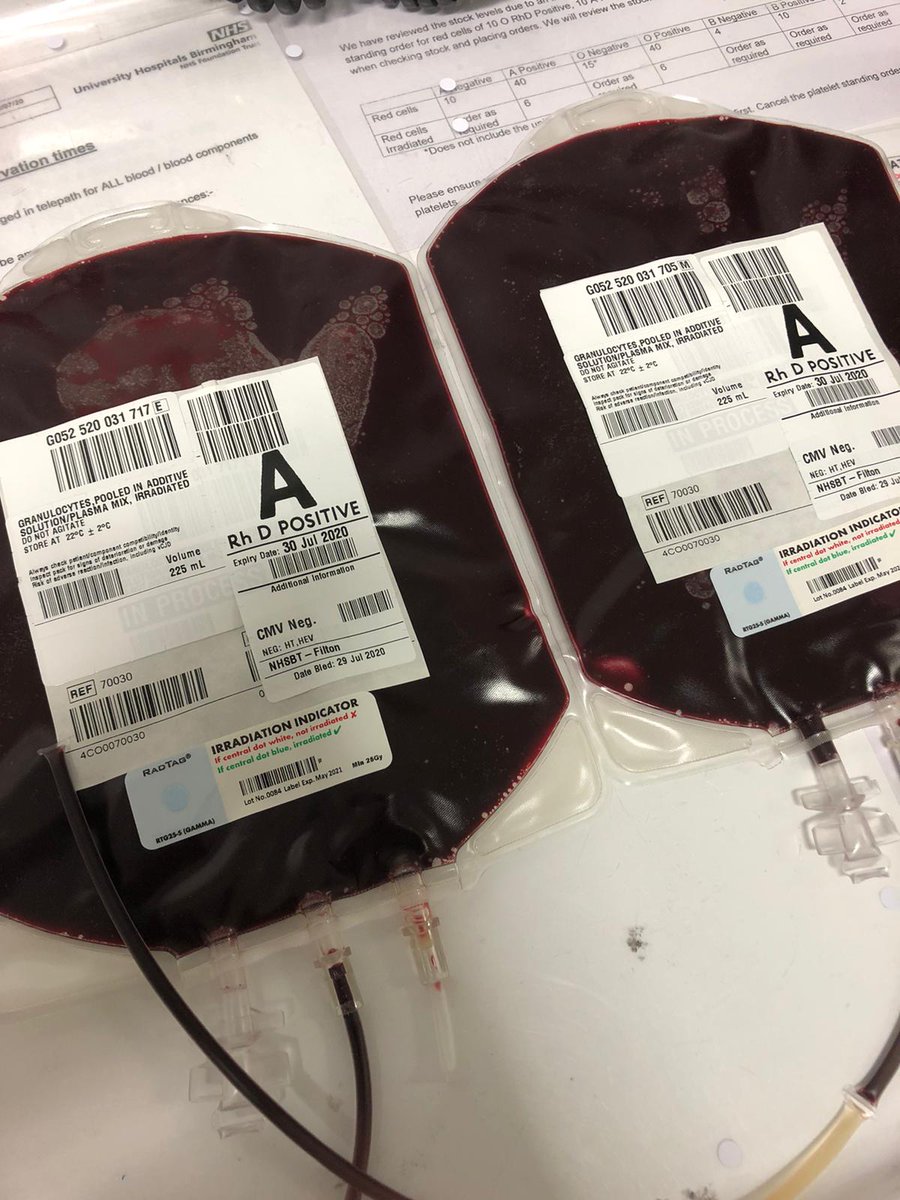I was on call for NHSBT last week and have discussed lots of patients for whom we have agreed to transfuse granulocytes (GTX). But what are they, when do we use them and how can you get hold of them? #blooducation 

I wrote a tweetorial and it was soooo long, so I’ve divided it into chunks (I LOVE granulocytes) 🙈. So, here’s part 1.
We often tell patients we can transfuse red cells and platelets, but not white cells. But that’s not really true! GTX are started in around 2 new patients/week in England (more last week!), and can be given for as long as is needed (more on dosing and timing later)
Broadly speaking, GTX are given to patients with neutropenia and severe refractory bacterial or fungal infection where all other options have been exhausted. They can also be used as primary or secondary prophylaxis.
According to our national GTX registry, ProGrES, 95% are given for treatment of infection (vs prophylaxis), and the most common cause of neutropenia in patients receiving GTX is AML. 20% recipients are children. 30% are undergoing stem cell transplant.
So why not give them to al neutropenic patients? GTX have side effects, most notably pulmonary reactions/TRALI. For patients who already have refractory chest sepsis, this can be bad news! There is also significant risk of HLA sensitisation....
....And lots of febrile transfusion reactions! Remember the risks of all of these events is reduced for other blood components by universal *leucodepletion* of UK blood components💡
So who should get GTX? TBH we don’t know! The evidence is poor. Cochrane reviews have not been able to demonstrate conclusive evidence with all studies significantly underpowered for mortality - although there is a suggestion of benefit from *high dose* GTX used as prophylaxis.
The biggest and most recent RCT to date was the RING study, where Price and colleagues were unable to recruit the intended number of patients
ncbi.nlm.nih.gov/pmc/articles/P…
ncbi.nlm.nih.gov/pmc/articles/P…
This was because of
• strongly held clinician perception of benefit or not
• discrepancy between study protocol and physicians’ decision to transfuse GTX
• failure to achieve target doses of granulocytes in 31%
• fewer patients meeting the inclusion criteria than anticipated
• strongly held clinician perception of benefit or not
• discrepancy between study protocol and physicians’ decision to transfuse GTX
• failure to achieve target doses of granulocytes in 31%
• fewer patients meeting the inclusion criteria than anticipated
The lack of evidence for effect demonstrated by the RING study cannot be used to say that GTX are not effective, because it lacked power. It is unlikely further RCTs will be undertaken as the issues around lack of equipoise remain
Most haematologists have had an experience where GTX have seemingly played a pivotal role in a patient’s recovery or their demise, and that heavily impacts on their inclination to use them in future. This is exactly when we need an evidence base to inform decision making!
NHSBT guidelines state GTX can be used in:
• severe npenia (<0.5) due to BM failure (acqd or congen) or severe congen nphil dysfunctn
• on active curative rx & anticipated BM recovery
• proven/highly probable bacterial or fungal infectn, unresponsive to antimicrobial therapy
• severe npenia (<0.5) due to BM failure (acqd or congen) or severe congen nphil dysfunctn
• on active curative rx & anticipated BM recovery
• proven/highly probable bacterial or fungal infectn, unresponsive to antimicrobial therapy
Guidelines are here. They do need an update though (next on my To Do list 😬)! NB apheresis GTX no longer available in England
nhsbtdbe.blob.core.windows.net/umbraco-assets…
nhsbtdbe.blob.core.windows.net/umbraco-assets…
But there are other groups of patients who may benefit, and in ProGrES we have seen many patients receiving GTX outside of these indications (with good outcomes although clearly I may be biased!). If you think you have a patient who may benefit from GTX then do call to discuss.
Thanks for following! More on practical elements of GTX tomorrow... bet you can't wait! 😉
Also special thanks to our tremendous @qehbham blood bank manager @JessCaldecott for the picture 😘
Also special thanks to our tremendous @qehbham blood bank manager @JessCaldecott for the picture 😘
Also realised our minimum stock levels are visible in the background 🤣🙈(but also clearly states they have been recently revised 🌟)
• • •
Missing some Tweet in this thread? You can try to
force a refresh




